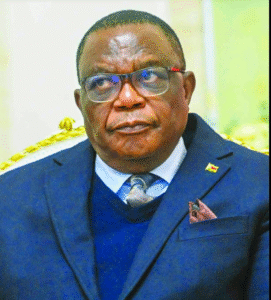MNANGAGWA’S NEPOTISM: A THREAT TO ZIMBABWE’S DEMOCRATIC FUTURE
In modern politics, the word nepotism evokes images of power abused, of rulers placing family above nation, and of public office turned into private fortune. Unfortunately, Zimbabwe under President Emmerson Mnangagwa is fast becoming a textbook example of how nepotism can corrode a country’s governance. His brazen appointment of close family members and political allies to key government posts has drawn widespread criticism, not just for undermining democracy, but for weakening state institutions and public trust.
The most glaring examples of Mnangagwa’s nepotistic tendencies are the appointments of his son, Kudakwashe Mnangagwa, as deputy Minister of Finance, and his nephew, Tongai Mnangagwa, as deputy Minister of Tourism. These appointments have rightly sparked outrage, given the glaring lack of any exceptional qualifications or notable public service records from either of them. But these are only two faces in a broader network of relatives and loyalists now occupying influential positions in government and state agencies.
What makes this trend even more alarming is how it marks a departure from previous norms, even under former president Robert Mugabe. For all his autocratic faults, Mugabe largely refrained from installing his family into ministerial roles for much of his rule. It was only near the end, with the rise of Grace Mugabe, that the public began to notice signs of family capture. Mnangagwa, by contrast, has wasted no time turning government into a family business. His wife, Auxillia Mnangagwa, frequently appears on official duties despite having no constitutional or legal mandate to represent the state. This is not only improper—it is a symbol of state capture by a single family.
Nepotism damages a country in ways that are not always visible at first. By bypassing merit-based appointments, it breeds inefficiency and incompetence. It shuts out capable professionals in favour of politically connected insiders. In a country like Zimbabwe—where the economy is in crisis, service delivery is collapsing, and unemployment is at record levels—nepotism adds insult to injury. It deepens citizens’ frustrations and sends the message that public office is no longer about service, but about patronage and personal enrichment.
This “our time to eat” culture is symptomatic of a broader system of kleptocracy. When top leadership openly appoints relatives to plum government jobs, it gives cover to lower officials to engage in the same behaviour. Corruption becomes institutionalised. Public funds meant for development are siphoned into private hands. Instead of focusing on reviving the economy, creating jobs, and delivering basic services, the government becomes preoccupied with enriching those in power and protecting their privileges.
Worse still, this form of leadership undermines succession planning and fosters dynastic ambitions. The deliberate positioning of family members in key posts raises the spectre of a family dynasty—a dangerous prospect for any country, but especially for one trying to rebuild after decades of economic ruin and political turmoil. Zimbabweans fought for democracy and representation, not to replace one form of autocracy with another.
Even arguments that Mnangagwa’s relatives may be qualified do not hold water. The fact remains: the president should never be in a position to hire or promote close family members into government roles. No amount of academic qualification can justify nepotism. Public appointments should be about competence, transparency, and independence—not about bloodlines.
Other democracies have recognised the dangers of nepotism and taken steps to limit it. In the United States, for example, an anti-nepotism law enacted in 1967 prevents officials from hiring relatives into government agencies. Zimbabwe urgently needs similar legislation. Without legal safeguards, the current culture of entitlement and family favouritism will only continue to fester.
The time to act is now. Civil society must demand that appointments in public service be based strictly on merit. Parliament must consider tabling anti-nepotism legislation to ensure fairness and protect the state from being captured by any family, no matter how powerful. Citizens must raise their voices and resist attempts to turn governance into a family affair.
Mnangagwa’s nepotism is not just a poor leadership choice—it is a national threat. It erodes the promise of a better Zimbabwe and locks out deserving citizens from the opportunity to serve their country. If left unchecked, it will deepen public despair, increase inequality, and stall the progress that so many Zimbabweans have fought for. The nation deserves better. It’s time to put Zimbabwe first—not family.



